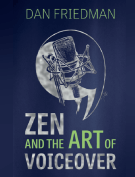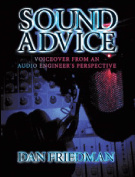 Am I ready to make your first voiceover demo? This may be the biggest question any aspiring voice talent will ask. With all of the attention the voiceover industry has received lately, it is no surprise that many people are asking this question right now. If you are new to the industry, there are several questions you should ask yourself (and ask others) before making your first demo. By answering honestly, you will have a much greater understanding of where you are in your career and whether or not you are truly ready to make your first voiceover demo.
Am I ready to make your first voiceover demo? This may be the biggest question any aspiring voice talent will ask. With all of the attention the voiceover industry has received lately, it is no surprise that many people are asking this question right now. If you are new to the industry, there are several questions you should ask yourself (and ask others) before making your first demo. By answering honestly, you will have a much greater understanding of where you are in your career and whether or not you are truly ready to make your first voiceover demo.
More Than Just a “Nice Voice”
Simply having a nice voice is not enough to achieve success in this business. There are several basic things you should be able to do before taking your desire to work as a voice talent to the next level. If you are unable to effectively communicate the message of a script or have trouble following and implementing given directions, then you are not ready to make a demo. If your reads almost always require editing and compiling of multiple takes of the same copy to get the correct inflections, energy or delivery into one cohesive piece of audio, then you are not ready to make a demo. Ideally, you should be able to read a well-written script from top to bottom, and communicate the messages of that script, without stumbling or requiring extensive editing. Prior to digital recording and editing… this was the standard.
What is a demo?
You probably know, or think you know, what a demo is. It is a representation of how your voice sounds and your ability to perform, right? Yes, but it is more than just that. Your demo is your business card, your resume’ and the number one way to be considered for a job or representation. Your demo should be interesting, perhaps even exciting and make someone want to hear more of you. It should not overstate or misrepresent who you are or your ability. It should accurately reflect your sound, style(s) and ability to deliver copy.
Where to Start
What do you need to get started on your demo? You will need some material, or scripts, to create your demo. This material should come largely from actual work that you have done. If you don’t have any, then you should use material from coaching sessions, voiceover workshops that you have taken and scripts from practice sessions. You are getting coaching or have taken workshops and have had almost daily practice sessions… haven’t you? If the answer is “no” then you are not ready to make a demo. The most important thing to know before making your first demo is that, before even considering it, you should have been doing voiceover on your own for quite some time. In other words, you should have been practicing. How long do you need to practice? Only your ears and the ears of others can tell you when you are ready.
Get Help
Do you know an engineer, producer, director or voiceover coach (or someone with voiceover experience who can perform these rolls) who will be completely honest with you about your deliveries? Does this person know how a voiceover demo should sound and how to produce a demo specific to your skills or what style you wish to present? Making a demo is not something you should do on your own. Even the most experienced voiceover talents know that a second set of experienced ears is critical to making a great demo. You will need someone to help direct you, make choices on what should be included and what should be left out. More importantly, you can only learn about the industry, from someone who works in the industry. Read books. Network. Get coaching. Attend workshops, classes and seminars. Make connections and don’t be afraid to ask questions.
Environment and Equipment
Ideally you should record your demo in a professional recording environment where you can focus on your deliveries and let someone else focus on the equipment. However, not all recording studios work with voiceover talent and simply having the equipment to record audio or even recording experience, does not mean that the studio engineer knows what is needed for voiceover. Furthermore, they may not have the music and sound effects libraries required to fully produce a professional sounding demo. Find a studio that does. Invest the time and money to have your demo done right.
Getting the Job Done
Speaking of equipment, do you have the necessary voiceover studio equipment to actually do a job? More importantly, do you know how to use it? These days being a voiceover talent usually requires more than a great voice and the ability to use it. At a minimum, you have to know how to record and edit. You also need to invest in the proper equipment to do so. This requires a good quality microphone, preamp, interface, computer, recording software, headphones, cables and ideally a sound-proof/acoustically treated room. This equipment needs to have the capability to reproduce your voice accurately without any electronic noise, distortion or coloration.
What Do You Do Best?
What is your specialty? What do you do best? The answer to these questions will determine what kind of demo you should make. There are many different types of voiceover work and your first demo should communicate what you do best. Commercials, phone systems, audio books, promos, imaging, characters and narrations (just to name a few) are all very different styles and formats. While there can be some overlap among them on your demo, you should be certain the emphasis is on what you do best or on the type of work you seek.
Final Steps
How should your demo sound when complete? It should be fully produced. It should have music and/or sound effects where necessary. It should have several vignettes that reflect your style and versatility. It should be interesting and hold the listener’s attention as it flows effortlessly from one spot to the next. It shouldn’t be more than a minute and a half long (although a minute to just over a minute is preferable). Most importantly, it should have your name and contact information on the physical medium itself. If you are sending it electronically be sure that the file contains your full name and the email contains several clear ways to contact you.
Making a demo is a critical step to taking your career to a professional level. I often receive submissions that are intended to be demos, but simply aren’t. Snippets of home recordings, answering machine messages and recorded ramblings of voices that you “like to do”, do not qualify as a demo and are a clear indication that you need training, experience and professional help. Perhaps in more ways than one for some people… if you could hear these you would know what I mean! I also frequently receive great sounding demos from “talent” who fall short of expectations when put to a live-session test read. Unfortunately, these people almost never get a second chance.
Your demo is vital to your success. Do not try to “go it alone”. Have it made with the help of industry professionals. Do not send out material that really isn’t a “demo”. Most importantly, be sure you are truly ready to take this important step by having a great sounding demo and being able to deliver on what your demo promises.
To listen to my latest demos visit:



